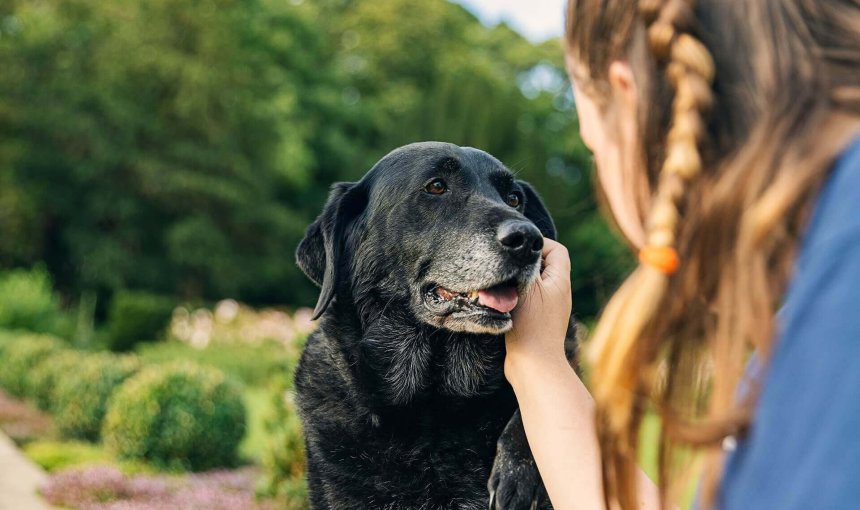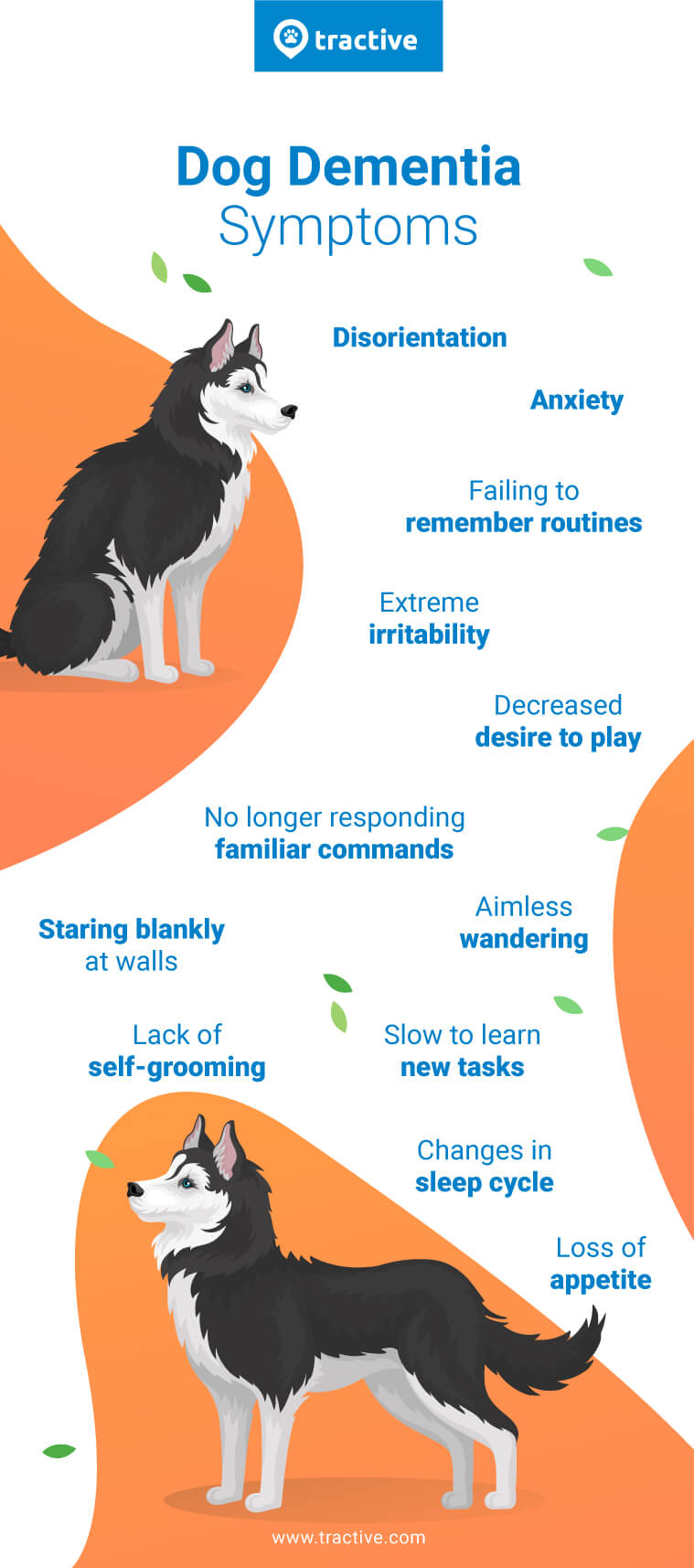 Approved by Dr. Dwight Alleyne, DVM
Approved by Dr. Dwight Alleyne, DVM Dog Dementia: How To Catch On To It Early
Your senior dog might be vulnerable to canine cognitive dysfunction (CCD) syndrome. So here's how it develops - and what you can do to prevent it and manage it better.

Is your dog displaying some curious behavioral changes? Failing to remember routines? Appearing disoriented or confused? They may be affected by dementia (or other symptoms of aging as they graduate to becoming senior dogs.) But what is dog dementia? How does it affect our furry friends? And how can tracking your dog’s sleep help you catch on to it early? Let’s dive right in.

Always know your buddy is healthy & safe
Read more- What is dog dementia?
- What are the symptoms and signs of dog dementia?
- How is dog dementia diagnosed?
- What are the causes of dog dementia?
- Can I prevent my dog from developing dementia?
- Is there a cure for dog dementia?
- What is the treatment for dog dementia?
- What should I do if I suspect my dog has dementia?
- What is the prognosis & outlook for dogs with dementia?
What is dog dementia?
Dog dementia, also known as Canine Cognitive Dysfunction (CCD), is a cognitive disorder in dogs associated with effects similar to those of Alzheimer’s in humans. It’s a condition related to the aging of a dog’s brain, which leads to changes in behavior and primarily affects memory, learning, and comprehension. Moreover, clinical signs of dementia are found in 50% of dogs over the age of 11.
It is estimated that 68% of dogs will suffer from dementia by the age of 15¹. But if you’re unsure how old your dog might be, here’s a guide on how to convert dog years to human years.
What are the symptoms and signs of dog dementia?
The early signs of canine dementia can be difficult to detect. They can often be misinterpreted as “just getting old.” However, early recognition is very important and all dog owners should be on the lookout for mild versions of these symptoms:
- Disorientation and confusion – Appearing lost or confused in familiar surroundings
- Anxiety
- Failing to remember routines and previously learned training or house rules
- No longer responding to their name or familiar commands
- Extreme irritability
- Decreased desire to play
- Aimless wandering
- Staring blankly at walls or at nothing
- Slow to learn new tasks
- Lack of self-grooming
- Loss of appetite
- Changes in sleep cycle like night waking and/or sleeping during the day

💡A Health Tracker for dogs can help you pick up on a change in your buddy’s sleep cycles quicker – which is often one of the first signs of cognitive decline. (Especially among senior dogs.) We’ll cover it in the detail a little further below.
How is dog dementia diagnosed?
If your dog is exhibiting any of above, it’s important to note that these symptoms do not necessarily indicate dog dementia. Moreover, they could be signs of another possible illness that your dog is suffering from. Diagnosis of dementia in dogs must be done by a professional, and the current means to do so is to rule out any other potential illnesses. So if you suspect that your dog may have dementia, a trip to your vet is essential. Your vet can conduct the appropriate tests to rule out any other conditions, or use an MRI to make the final diagnosis.
In the best case scenario, your dog should already visit the vet for checkups regularly, so symptoms of dementia can be detected and treated early on.
What are the causes of dog dementia?
The exact cause for dog dementia is currently unknown. However, the disease is often caused by the fact that the brain function is affected by the physical and chemical changes that occur along with the aging process.
At the same time, age related cognitive decline is not the only condition that causes dementia in dogs. Genetic factors or other diseases like brain tumors and brain trauma may also predispose an animal to develop the dementia.
Can I prevent my dog from developing dementia?
Because an exact cause is unknown, it is difficult to determine exactly how to prevent dementia in dogs. However, keeping your dog physically and mentally active may help to prevent dementia. Follow these steps to keep your buddy’s mind sharp and healthy:
- Don’t skip on regular exercise
Play games together with your dog and make sure they get some daily outdoors time. - Keep your dog mentally active
By teaching them new tricks or new commands, you can both keep them engaged and deepen your bond. - Feed your dog a balanced, whole food diet
Dogs are omnivores and can safely eat a number of vegetables and fruits. On the other hand, stay informed on what can dogs not eat as well. Consider brain-healthy supplements with the advice of your vet. - Help your dog socialize
Meeting new pets and people can help them stay socially and mentally active as well. However, avoid forcing them to interact longer than they’re comfortable. - Watch out for a change in your dog’s sleep cycles
More often than not, this could be one of the first signs of cognitive decline as your dog’s brain activity changes due to aging.

Get health alerts for your dog
Our pups can’t always tell us if something’s wrong. But if their tracker detects unusual changes in their routine, you’ll get an alert, helping you catch potential issues early.
Is there a cure for dog dementia?
At this time, there is no known cure for dog dementia. The condition leads to the physical deterioration of the brain. Therefore, there is no simple corrective measure that can regenerate these tissues. However, research into this subject is already being conducted, with potential cures involving stem cell therapy² as well as pharmaceuticals.³
What is the treatment for dog dementia?
While there is no known cure for dog dementia, there are several options to treat this condition. Treatment includes prescription drugs, diet changes, life enrichment, supplements and surgery. We recommend to consult a vet first and foremost, to determine the best treatment options for you and your elderly dog.
What should I do if I suspect my dog has dementia?
If your dog is showing any of the above signs of dementia, visit your veterinarian for a check-up. Your vet will go over your dog’s history with you in great detail. They might also perform a complete physical examination to evaluate the overall health status and cognitive functions of your dog.
Your vet may also recommend some diagnostic tests, like blood tests, ultrasounds, and X-rays, to check for other health problems. If they determine that your dog has dementia, he or she will then discuss the various options with you.
What is the prognosis & outlook for dogs with dementia?
Ultimately, the aging process of dogs is unavoidable, and most of our furry friends will face some health issues as their days reach their limit. Here are some steps you can take to make the situation as comfortable and safe as possible for your dog.
- Activity
Keep walking your dog – or use a stroller or wagon, if they can’t walk. - Social interaction
Take your dog to a park or somewhere they’ll be around other dogs. However, be aware of your dog’s limits around other people and pets. - Nature
Expose your dog to sunlight to help regulate the sleep-wake cycle. They’ll also benefit from the sensory stimulation from being in nature. - Routine
Establish feeding, watering, and walking routines and patterns for your dog’s comfort. Try to keep your dog’s home and surroundings as familiar and friendly as possible. - Indoor security
Pet-proof your house like you would for a new puppy or toddler. Use diapers, waterproof bedding, pads, or furniture if necessary. - Food
Try switching to prescription senior dog food, or a whole foods natural diet². Add supplements to the dog’s diet, but only under the guidance of a vet. For example, certain prescription diets like the Purina Pro Plan Bright Mind diet are designed to support your dog’s cognitive health.
And finally…
- Keep track of your dog’s health & wellbeing
A dog GPS & Health tracker can help you monitor your dog’s activity and sleep minutes (besides just their location.) So you can catch on to a change in your dog’s sleep cycles that much quicker, share actionable data with your vet, and help your buddy live their best life by your side.
Your furry friend’s health and wellbeing means as much as to us as it does to you. So we’ve made it a priority to only share medically-relevant content on our blog. This post was checked, double-checked, and medically verified by Georgia-based vet, Dr. Dwight Alleyne.

Dr. Dwight Alleyne, DVM
Originally from Long Island, New York, Dr. Alleyne began his career at a no-kill animal shelter before becoming a licensed veterinary technician. He graduated from Cornell University Veterinary College in 2006 and completed an internship at Purdue University. Now practicing in Georgia, Dr. Alleyne specializes in soft tissue surgery and ultrasounds. He also writes pet health articles on his website, “The Animal Doctor Blog” (www.anmldrblog.com).



